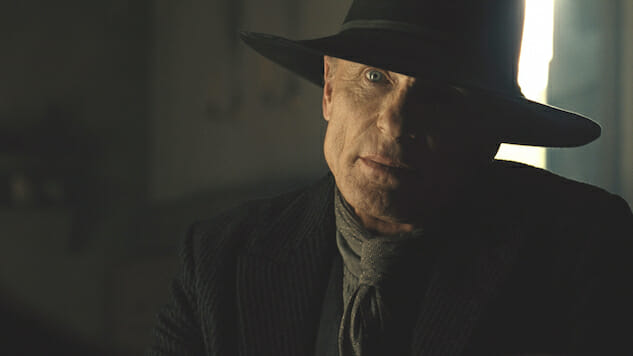Westworld: “Reunion” Deepens Our Understanding of the Park’s Origins
(Episode 2.02)
Photo: John P. Johnson/HBO
The biggest reunion in this week’s Westworld isn’t between any of the characters—though there are a few meetings that you might’ve been expecting—but between the audience and a reason to care about the central quest. Ah, motivation outside of speculation! In the mysterious trenches of Season One, it was sometimes hard to discern if you were watching because you liked the characters or because it was a dozen-hour-long word problem you were assigned by your social media feeds. But now, thanks to “Reunion”—and its continuation of the season’s focus on the characters behind the park and its effect at large on a real human population—it’s never been more worth watching.
The 2001: A Space Odyssey-like match cut of the opening credits, between a hat and bison both twirling in the air in slow-motion, compliments the bald-headed host mother and child being created before our eyes. It’s not Stanley Kubrick’s Star Child, because that’s a symbol of human evolution. Westworld, especially this season, is about a new sentient species taking over where humans failed. To understand this failure, we have to understand why the park began.
That means a big flashback. One where we’re reminded that, oh yeah, the Arnold behind the park and the Bernard-bot still inside it looked exactly the same—and what Jeffrey Wright does with both is enthralling. The episode opens with Arnold and Dolores (Evan Rachel Wood) walking through a real, human city on the eve of the host’s debut, showing the simple country AI the big city. Arnold tells her about his wife (who is probably more than a little concerned with his favoritism towards this host) and his son, Charlie. Even though he’s building with his son in mind—be it his swanky downtown home or his complex android—he’s not sure anyone deserves the mechanical and technological wonders of the modern world. At least, nobody human.
As we see throughout the episode, since we keep flashing back to the park’s beginnings with Dolores and Angela (Talulah Riley), the methods by which the project began were always sinister and always doomed to failure. It was pitched as a sexier, darker version of Jurassic Park—but instead of being built entirely by an eccentric grandfather, it was funded by Wall Street bros and YouTube stars. A theme park like you’ve never seen (and for good reason). A silly scene where an investor is unknowingly shown the merchandise at a meeting has a predictable, if well-acted, payoff and the financial courtship practices of Delos are predictably id-ridden. At least the heir who’s the target of these advances (Ben Barnes) is unabashedly and refreshingly bisexual when recruiting for the host-laden orgy that secures his backing.
Another flashback later in the episode shows the same heir/investor seeming permanently affected by his work, introducing James Delos (Peter Mullan) and William (Jimmi Simpson) to the idea of Westworld. He sees it as a betrayal of humanity, even if he’s just taking as many hosts as possible to the sad sack (that’s what I call his bed). For why he sees it as a betrayal, we’ve got to jump back to the future.
This is a future where Dolores and her crew are tricking humans into leading them to the inside of the park, the secret tunnels and maintenance bays where she can really do some damage. This is where Teddy (James Marsden) wakes up. The turning of Teddy, as he sees disassembled hosts brought back, is a showcase for the perennially underappreciated actor, who delivers some genuinely staggering reaction shots that make you think about the gut punch while you’re doubled over. Marsden accomplishes the impossible task of looking like he’s reckoning with the collapse of his identity and reality. No screaming, no weeping, no speeches. He just looks like the world dropped out from under him.